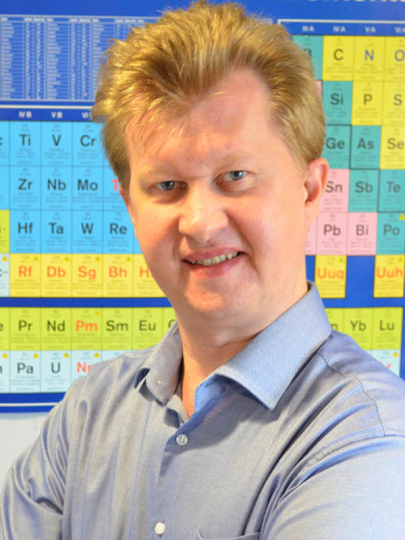Vladimir TorbeevInstitut de science et d'ingénierie supramoléculaires - CNRS / Université de Strasbourg
Mes recherches
My research combines methods of chemistry and biophysics to study biological problems. The subjects include protein misfolding and aggregation involved in neurodegenerative diseases, new methods of synthesis of protein libraries and approaches to target intrinsically disordered proteins in cells. I have obtained Ph.D. degree in Chemistry from University of Chicago under direction of Prof. Stephen B. H. Kent for the work dedicated to total chemical synthesis and biophysical studies of HIV-1 protease. Then, I performed postdoctoral studies with Prof. Donald Hilvert at ETH Zurich working on the molecular mechanism of misfolding and aggregation of β2-microglobulin. In 2014, I became a junior group leader at Institut de Science et d’Ingénierie Supramoléculaires and an assistant professor at the University of Strasbourg. ATIP-Avenir award in 2015 allowed me for making the first steps in my independent research career.
Mon projet ATIP-Avenir
Towards the understanding of molecular mechanisms of amyloidosis by chemical protein synthesis
Despite protein-misfolding diseases (e.g. Alzheimer’s, Parkinson’s diseases, dialysis-related amyloidosis) affect millions of people worldwide, the current understanding of these disorders is insufficient to develop the efficient treatments. The proposed research program aims to significantly advance the understating of molecular mechanisms of protein misfolding and aggregation into amyloids, which are critical in etiology of these disorders. Chemical protein synthesis will be used (i) to prepare libraries of D-amino acid containing proteins in order to find the variants that are most amyloidogenic, (ii) to engineer molecules mimicking toxic intermediate species, which precede formation of larger protein aggregates (amyloids), and (iii) to de novo design amyloids for their application in the synthesis of new biomaterials and biosensors. The findings will be helpful to identify molecular targets for designing novel drugs and diagnostics against protein-misfolding diseases.
Vladimir Torbeev est également lauréat ERC Starting Grants 2016.
